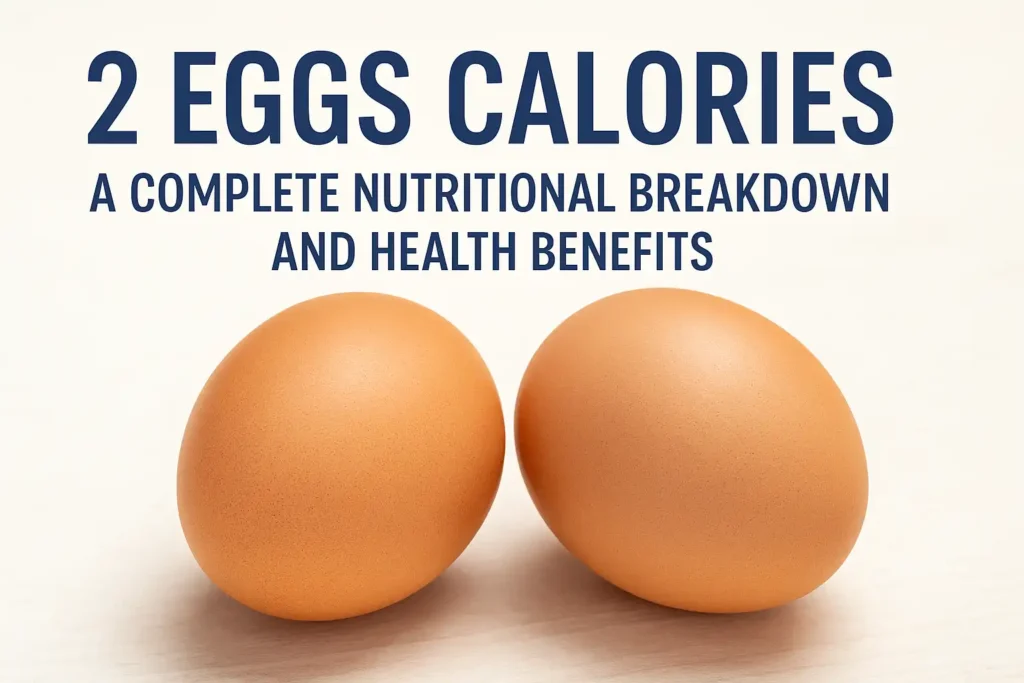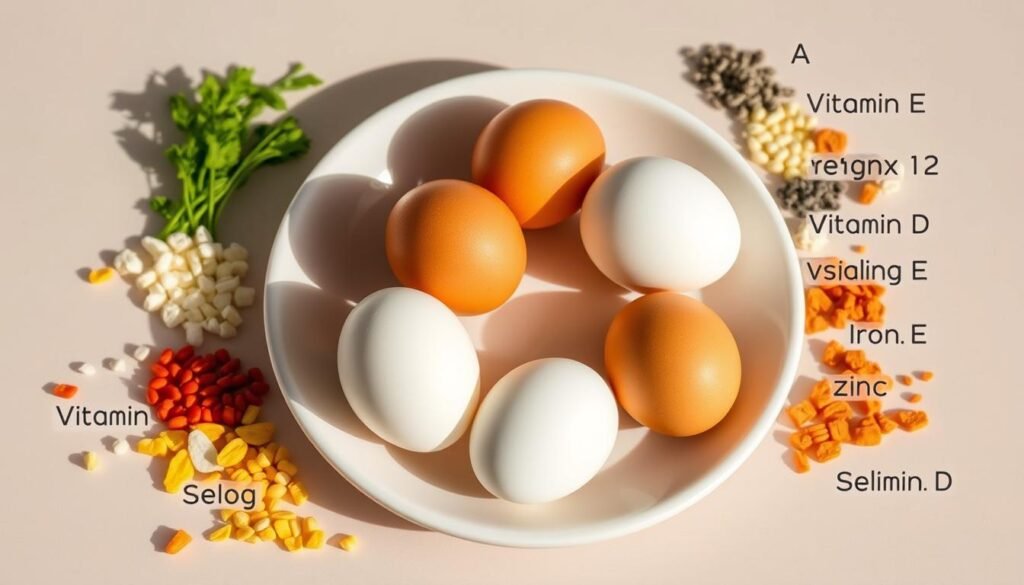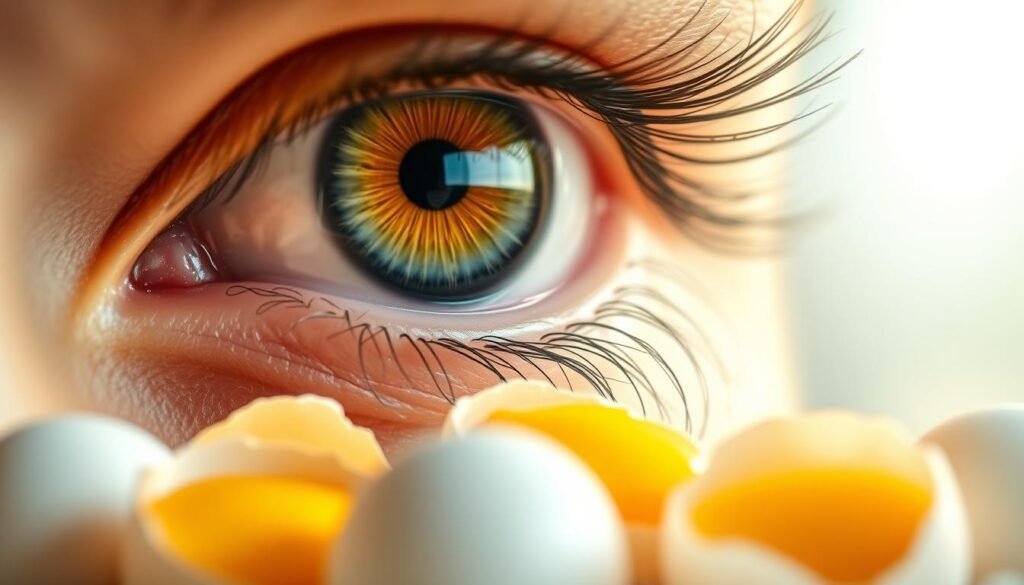
Key Takeaways
- Eggs are a nutrient-rich food, providing protein, vitamins, and minerals.
- They are relatively low in calories, making them a great addition to a healthy diet.
- Eggs are an excellent source of choline, a nutrient often lacking in modern diets.
- The nutritional benefits of eggs can support overall health and well-being.
- Including eggs in your diet can be a great way to boost your protein intake.
The Nutritional Profile of Two Eggs
Knowing the nutritional value of two eggs is key for good diet choices. Two eggs pack a lot of nutrients important for our bodies.
Basic Calorie Content
Two large eggs usually have about 144 calories. The calorie count can change a bit based on egg size.
Macronutrient Overview
Eggs are a top protein source, with two large eggs giving about 12 grams of protein. They also have about 10 grams of fat, some of which is saturated.
| Nutrient | Amount in 2 Eggs |
|---|---|
| Calories | 144 |
| Protein | 12g |
| Fat | 10g |
| Carbs | 0.8g |
Eggs are a nutrient-rich food. They offer a good mix of protein and healthy fats with very little carbs.
Understanding 2 Eggs Calories in Detail
To understand eggs better, let’s look at their calorie content. The calories in two eggs depend on their size and the yolk and white’s calorie split.
Calories in Different Egg Sizes
Egg size greatly affects calorie count. Here’s a look at calories in different egg sizes:
| Egg Size | Calories per Egg | Calories for 2 Eggs |
|---|---|---|
| Small | 54 | 108 |
| Medium | 63 | 126 |
| Large | 72 | 144 |
| Extra-Large | 80 | 160 |
| Jumbo | 90 | 180 |
Calorie Distribution Between Yolk and White
The yolk and white of an egg have different calorie counts. The yolk, the yellow part, has most of the egg’s calories and nutrients. The egg white, or albumen, is mostly protein and has fewer calories.
Egg Yolk: About 55 calories per large egg yolk.
Egg White: About 17 calories per large egg white.
Net Carbs and Dietary Fiber
Eggs are low in carbs, good for low-carb diets. A large egg has about 0.6 grams of carbs, with almost no dietary fiber.
Knowing about eggs’ nutritional content helps in diet planning. They’re great for watching calories or getting enough protein.
How Cooking Methods Affect Egg Nutrition
Eggs are not just about what’s inside. How you cook them matters too. Different ways of cooking can change how many calories and nutrients eggs have.
Hard-Boiled Eggs Nutrition
Hard-boiling eggs is a low-calorie way to cook. A large hard-boiled egg has about 78 calories. It’s packed with protein, healthy fats, and vitamins and minerals. This method doesn’t need extra oil or butter, making it a healthy choice.
Scrambled Eggs Calorie Content
Scrambled eggs can have more calories, mainly if you add butter or milk. A large scrambled egg has about 90-100 calories. To stay healthy, use little butter or choose a non-stick pan.
Fried Eggs and Added Calories
Frying eggs adds extra calories because of the oil or butter. A large fried egg can have 120 to 180 calories or more. While fried eggs can be part of a healthy diet, eat them in moderation.
Choosing the right cooking method makes eggs a nutritious breakfast choice. Whether you like them hard-boiled, scrambled, or fried, watch what you add. This way, you get the most nutritional benefits.
Protein Content and Quality in Two Eggs
Eggs are a complete protein, which means they have all nine essential amino acids. This makes them a great protein source for health.
Eggs are also very bioavailable. This means our bodies can easily use their protein. It’s important for fixing and growing muscles.
Complete Protein Profile
Eggs have all the amino acids we need for muscle health. They have histidine, isoleucine, leucine, lysine, methionine, phenylalanine, threonine, tryptophan, and valine. These amino acids help with many body functions.

Essential Amino Acids
Essential amino acids are key for our bodies. They help build and fix tissues, make enzymes, and hormones. Eggs are full of these amino acids, making them great for a balanced diet.
Daily Protein Requirements and Eggs
How much protein we need changes based on our age, sex, weight, and activity level. For most adults, it’s about 0.8 grams of protein per kilogram of body weight per day. Two large eggs give us about 12-14 grams of protein.
If you’re an athlete or very active, eggs are even more important. They help you meet your protein needs. This supports your health and fitness goals.
Fat Content and Composition in Eggs
Learning about the fat in eggs can help us see their place in a healthy diet. Eggs get a lot of attention for their fat, but it’s key to know the types of fats they have.
Healthy Fats in Eggs
Eggs are a great source of healthy fats. They have monounsaturated and polyunsaturated fats. These fats are good for your heart and help your body absorb vitamins.
Omega-3 Fatty Acids in Eggs
Some eggs have omega-3 fatty acids. This is because the hens that lay them eat special feed. Omega-3s are good for your brain and can lower inflammation.
Cholesterol Content: Facts and Context
Eggs have a lot of cholesterol. A big egg has about 186 milligrams. But, for most people, dietary cholesterol doesn’t raise blood cholesterol much. It’s more about what you eat overall.
In short, eggs have both healthy fats and cholesterol. Knowing this helps us decide if eggs are right for our diet.
Vitamins and Minerals in Two Eggs
Two eggs are more than just breakfast. They’re packed with vitamins and minerals. Eggs are full of nutrients and low in calories.

Choline and Brain Health
Eggs are rich in choline, great for your brain. Choline turns into acetylcholine, helping with memory and thinking. Not having enough choline can lead to brain problems. So, eggs are good for your brain.
B Vitamins: B12, Riboflavin, and Folate
Eggs have lots of B vitamins like B12, riboflavin, and folate. B12 helps make red blood cells and keeps nerves working. Riboflavin boosts energy and fights migraines. Folate helps cells grow and prevents birth defects.
Selenium and Other Essential Minerals
Eggs also have minerals like selenium. Selenium fights cell damage and boosts the immune system. Eggs also have phosphorus for bones and zinc for healing.
Lutein and Zeaxanthin for Eye Health
The yolks of eggs have lutein and zeaxanthin, good for your eyes. These antioxidants protect eyes from blue light and prevent eye diseases. Eating eggs can help keep your eyes healthy.
Knowing what’s in eggs helps us see their value in our diet. Eggs support brain health, boost energy, and protect vision. They’re a smart choice for a healthy diet.
Egg Yolk vs. Egg White: Nutritional Comparison
Knowing the nutritional differences between egg yolks and whites is key. Eggs are packed with protein, vitamins, and minerals. But, the yolk and white have different amounts of these nutrients.
Calorie Distribution
Egg yolks have most of the calories and fat. Egg whites, on the other hand, are mostly protein with few calories.
| Component | Calories | Protein (g) | Fat (g) |
|---|---|---|---|
| Egg Yolk | 55 | 2.7 | 4.7 |
| Egg White | 17 | 3.6 | 0.1 |
Nutrient Concentration Differences
Egg yolks are full of vitamins and minerals like vitamin D, B12, and iron. Egg whites are high in protein but have fewer vitamins and minerals than yolks.
“The egg yolk is a rich source of essential nutrients, including choline, which is vital for brain health and metabolism.”
When to Choose Whole Eggs vs. Egg Whites
Choosing between whole eggs and egg whites depends on your diet. Whole eggs offer a complete nutritional profile. Egg whites are better for high protein with less calories.
In conclusion, both egg yolks and whites have their benefits. Knowing their differences helps you make better diet choices.
Health Benefits of Consuming Two Eggs Daily
Eating two eggs a day is good for you. They are full of nutrients like proteins, vitamins, and minerals. These help keep you healthy and happy.
Brain Development and Cognitive Function
Eggs have a lot of choline. Choline helps your brain grow and work better. More choline means better memory and thinking skills.
Eye Health and Macular Degeneration Prevention
Eggs have antioxidants like lutein and zeaxanthin. These protect your eyes from damage. They help keep your vision sharp.

Muscle Building and Recovery
Eggs are great for building muscles. They have all the amino acids your muscles need. Eating eggs after working out helps your muscles recover.
Satiety and Weight Management
Eggs make you feel full because of their protein. This can help you eat fewer calories. Eating eggs for breakfast can help you stay full and manage your weight.
Adding two eggs to your diet every day is very beneficial. It boosts your brain, eyes, muscles, and helps with weight control.
Eggs in Various Dietary Patterns
Eggs are a dietary chameleon, fitting into various eating patterns with ease. Their versatility and nutritional profile make them an excellent choice for different diets.
You can incorporate eggs into your diet in numerous ways, regardless of your dietary preferences or restrictions. For those following specific diets, eggs offer several benefits.
Low-Carb and Keto Diets
Eggs are an ideal food for low-carb and keto diets. They are low in carbohydrates and rich in healthy fats and proteins. They can be a staple in meals, providing the necessary nutrients while keeping carb counts low.
Vegetarian Diets
For vegetarians, eggs are a valuable source of protein. They provide essential amino acids and various vitamins and minerals.
Athletic Nutrition
Athletes often require high amounts of protein to support muscle repair and growth. Eggs are a high-quality protein source that can be easily integrated into an athlete’s diet, supporting their nutritional needs.
Dietary Guidelines
Both Canada’s Food Guide and USDA Guidelines recognize eggs as a nutritious food. They recommend eggs as a good source of protein and various essential nutrients.
In conclusion, eggs are a versatile food that can fit into various dietary patterns. From low-carb and keto diets to vegetarian diets and athletic nutrition plans. Their nutritional value and adaptability make them an excellent choice for many individuals.
Practical Meal Planning with Eggs
Eggs are great for boosting your protein and adding variety to meals. They’re a staple that fits well in many recipes. This makes them perfect for planning meals.
High-Protein Breakfast Ideas
Begin your day with a protein-packed breakfast. Try scrambled eggs with spinach and feta cheese or a breakfast burrito with eggs, black beans, and avocado. These dishes are tasty and keep you full.
For a quick breakfast, make hard-boiled eggs the night before. Eat them with whole-grain toast or a complex carb for energy all morning.

Beyond Breakfast: Lunch and Dinner Egg Recipes
Eggs are good for more than just breakfast. Make a quiche Lorraine for dinner or egg salad sandwiches for lunch. Add eggs to stir-fries and curries for more protein.
Eggs and Toast: Complete Nutritional Analysis
Eggs and toast can be a healthy meal. Use whole-grain bread and add eggs for protein and carbs. Add spinach or tomatoes for extra nutrition.
Meal Prep Tips for Egg-Based Dishes
Meal prep gets easier with eggs. Hard-boil eggs ahead of time for a quick snack. Make egg muffins or frittatas for fast meals. Prepare egg salad on the weekend for the week.
Adding these egg-based meals to your plan means healthy, tasty dishes all week. As
“Eggs are a great source of protein and can be used in a multitude of dishes, making them an excellent addition to any meal plan.”
Addressing Common Concerns About Eggs
You might wonder about eggs and their health effects. Eggs are full of nutrients but can raise health concerns. We’ll look into these worries to guide you on eggs in your diet.
Eggs and Heart Health: Current Research
Eggs and heart health have sparked debate. New studies say eggs can be good for the heart if eaten in small amounts. Dietary cholesterol has a small effect on blood cholesterol levels for most people. Eggs are also packed with nutrients that boost health.
Egg Allergies and Alternatives
Egg allergies are common, mainly in kids. If you’re allergic, finding protein substitutes is key. Almond milk, tofu, and egg replacers work well in recipes. Always talk to a doctor or dietitian about managing egg allergies.
Quality Differences: Organic, Free-Range, and Conventional
“Organic,” “free-range,” and “conventional” describe how hens are raised. Organic eggs come from hens eating organic feed. Free-range eggs are from hens that go outside. Conventional eggs come from hens in more crowded farms. The nutritional differences are small, but some choose organic or free-range for animal and environmental reasons.
| Type of Egg | Farming Practice | Nutritional Difference |
|---|---|---|
| Organic | Hens fed organic feed | Minimal difference |
| Free-Range | Hens have outdoor access | Minimal difference |
| Conventional | Intensive farming systems | Reference point |
Conclusion
Eggs are a great food because they are full of nutrients. They have high-quality protein, healthy fats, and important vitamins and minerals. Knowing about 2 eggs calories and egg nutrition helps you make better food choices.
Eggs are good for your brain, eyes, and muscles. They can help you stay healthy, support your athletic goals, or just keep you feeling good. Eggs are a smart choice for your diet.
Adding eggs to your meals is easy and tasty. There are many ways to cook them and lots of recipes to try. By eating eggs, you get lots of health benefits and support your overall well-being.
FAQs
How many calories are in 2 eggs?
The calories in 2 eggs depend on their size. But, on average, 2 large eggs have about 140 calories.
Are eggs a good source of protein?
Yes, eggs are great for protein. They give about 12-14 grams of protein per 2 large eggs. They have all the amino acids you need.
How do different cooking methods affect the nutritional value of eggs?
Cooking eggs can change their nutrition. Frying eggs adds extra calories from oil. But, hard-boiling or poaching eggs keeps their nutrients.
What is the difference in nutritional content between egg yolks and whites?
Egg yolks have most of the egg’s fat, vitamins, and minerals. They have choline, lutein, and zeaxanthin. Egg whites are mostly protein. Whole eggs give a better mix of nutrients than egg whites alone.
Can eggs be part of a low-carb or keto diet?
Yes, eggs fit well in low-carb and keto diets. They are high in protein and fat but low in carbs. They’re a good, nutritious choice for these diets.
How do eggs impact heart health?
Eggs can be good for the heart when eaten in moderation. They have nutrients like omega-3 fatty acids and antioxidants that help heart health.
Are there any concerns about egg allergies?
Yes, egg allergies are common, mostly in children. People with egg allergies should avoid eggs and egg products. They should look for other protein sources.
What is the nutritional difference between organic, free-range, and conventional eggs?
Organic and free-range eggs might have better fatty acids and vitamins than conventional eggs. This is because of how they’re farmed and the hens’ diets.
Can eggs support muscle building and recovery?
Yes, eggs are good for building muscle and recovery. They have all the amino acids needed for muscle repair. They’re popular among athletes and fitness fans.
How can I incorporate eggs into my meal planning?
Eggs are easy to add to many meals. Try them in breakfasts, salads, or meal prep. You can boil, scramble, fry, or poach them to mix up your diet.
How many calories are in 2 scrambled eggs?
Two scrambled eggs have around 180–200 calories, especially if cooked with butter or oil. Using minimal fat keeps the calorie count lower.
Are 2 boiled eggs healthier than fried eggs?
Yes, boiled eggs are usually healthier as they don’t require added fats. Fried eggs can have more calories due to cooking oils or butter.
What is the calorie count in 2 fried eggs?
Two fried eggs can contain 180–220 calories depending on the oil or butter used during cooking.
Do 2 eggs in an omelette have more calories?
An omelette made with 2 eggs and vegetables has about 200–250 calories. Additions like cheese or meats can raise the total further.
How many calories are in 2 sunny side up eggs?
Two sunny side up eggs have about 160–200 calories, depending on the amount and type of fat used to cook them.
What are the calories in just 2 egg whites?
Two egg whites have roughly 34 calories and offer a lean source of protein without fat or cholesterol.
How many calories are in 2 hard-boiled eggs?
Two hard-boiled eggs contain about 140–160 calories and retain most nutrients without added fats.
Is there any risk in eating 2 raw eggs?
Raw eggs carry a risk of salmonella. They have similar calories to cooked eggs but may be harder to digest.
Do cooked eggs lose nutrients?
Cooking eggs slightly reduces some nutrients like vitamin B1, but overall, they remain a rich source of protein and essential vitamins.

